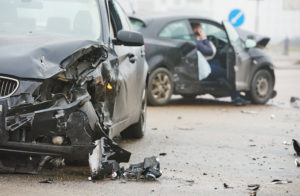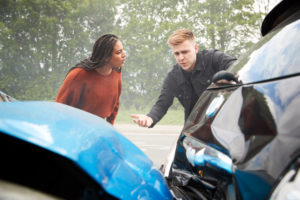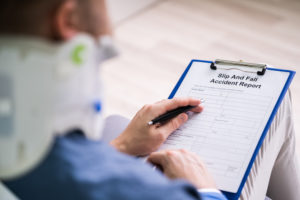Is Virginia a No-Fault State?
Virginia is not a pure no-fault state when it comes to car accidents. Instead, it follows a fault-based system, also known as a tort system, for resolving car accident claims. If you’ve been in an accident and need to assess how much you qualify to receive for your losses, engaging with a Richmond car accident lawyer can help you understand your rights and options.
Learn the definition of a no-fault state and how Virginia differs from the Pendleton Law Team. We’ve compiled information from commonly asked questions to guide you through the compensation process and offer a free initial consultation if you need further assistance exploring the legal options available to you.
What Does It Mean When a State Is a “No-Fault State”?
When a state is referred to as a “no-fault state,” it means that the state’s auto insurance laws require drivers to carry personal injury protection (PIP) coverage as part of their auto insurance policy.
Unlike Virginia, in a no-fault state, if a car accident occurs, each party involved in the accident is typically responsible for seeking compensation for their own injuries and damages from their respective insurance companies, regardless of who was at fault for the accident.
The underlying principle of a no-fault system is to streamline the claims process and ensure that individuals involved in car accidents receive prompt medical treatment and financial support without having to go through lengthy legal proceedings to determine fault.
By relying on their own insurance coverage, individuals can seek reimbursement for medical expenses, lost wages, and other accident-related costs directly from their insurance company with the help of a trusted personal injury lawyer in Richmond.
For a Free Legal Consultation
Call The Personal Injury Lawyer Hotline.
804-250-5050
How Does Virginia’s Fault-Based System Work?
In Virginia, the fault-based system determines liability in car accident cases. Since Virginia is not a no-fault state, the party who is found to be at fault for the accident is responsible for compensating the injured party. The injured party can seek compensation by filing a claim with the at-fault driver’s insurance company or by pursuing a lawsuit against the at-fault driver.
Let the Heavy Hitters® Take On Your Case 804-250-5050
What Are the Insurance Requirements in Virginia?
The Virginia Department of Motor Vehicles enforces the requirement set forth by the Code of Virginia § 46.2-472, which states that drivers must carry minimum liability insurance coverage. The current minimum limits are $30,000 for bodily injury or death per person, $60,000 for bodily injury or death per accident, and $20,000 for property damage per accident.
These insurance requirements help ensure that drivers have financial responsibility to cover damages they may cause in accidents since PIP is not required in Virginia as a fault-based state.
Central Virginia's Top Rated Personal
Injury Lawyers 804-250-5050
How Do Insurance Limits Impact Car Accident Claims in Virginia?
In Virginia, which is not a no-fault state, insurance limits play a significant role in car accident claims. If the damages resulting from an accident exceed the insurance policy limits of the at-fault driver, the at-fault driver may become personally responsible for the remaining amount.
In these situations, the injured party may need to consider pursuing legal action with a Richmond personal injury law firm in order to seek compensation that goes beyond the confines of the insurance limits.
Let Us Be The Heavy Hitters® For Your Case Speak To An Attorney Now
What Common Damages Are Recoverable in a Fault-Based State Like Virginia?
In a car accident case in Virginia, there are various types of damages that individuals can seek to claim based on the specific circumstances of the accident and the resulting injuries and losses. Common categories of damages that may be pursued include:
- Medical Expenses: This encompasses the costs associated with medical treatment, hospitalization, surgeries, medications, rehabilitation, and other necessary medical expenses related to the accident. It includes both current and anticipated future medical costs resulting from the injuries sustained.
- Property Damage: This entails the expenses related to repairing or replacing the damaged vehicle or any other property affected by the accident. It covers the costs of repairs, the vehicle’s value if it is considered a total loss, and any other damaged personal belongings.
- Lost Wages: If the injuries sustained in the accident prevent the victim from working, they may be eligible to seek compensation for the income lost during the recovery period. Additionally, if the injuries result in a long-term impact on the individual’s ability to work, they may pursue compensation for the future loss of earning capacity.
- Pain and Suffering: Pain and suffering damages are designed to address the physical pain, emotional distress, and mental anguish experienced as a result of the accident and subsequent injuries. These damages are subjective and are influenced by the severity of the injuries and their impact on the overall quality of life.
- Punitive Damages: In egregious cases involving extreme negligence or intentional misconduct, punitive damages may be awarded to punish the at-fault party and set a precedent to deter similar behavior. However, without the help of a reputable and skilled lawyer, the chances of winning punitive damages are slim.
If I Get a Ticket, Do I Have a Case?
Whether you have a case after receiving a ticket during a car accident in Virginia depends on if it was a moving violation or not. For instance, if you ran through a red light, bumped a stop sign, or was speeding through a yellow light, liability may be assigned to you.
Receiving a ticket does not automatically mean you are at fault for the accident. It is the responsibility of insurance companies, law enforcement, and potentially the courts to determine liability based on the evidence and circumstances of the accident. The ticket itself may indicate that a law was violated, but it is not conclusive proof of fault.
Does Shared Fault Impact Virginia’s Fault-Based System?
Virginia follows a legal doctrine known as the “contributory negligence” rule. This means that if you are found even slightly at fault for the accident, you may be barred from recovering any compensation.
If you lived in a no-fault state, shared fault would not impact your ability to collect a settlement. However, Virginia is not a no-fault state so any liability that you share in the accident can reduce the size of your payout. The Pendleton Law Team can help you understand how this rule may affect your specific case.
What Is MedPay Coverage and How Does It Work in Virginia?
MedPay coverage, or medical payments coverage, is an optional insurance coverage available in Virginia. It helps pay for medical expenses resulting from a car accident, regardless of fault. MedPay coverage can be used to cover all accident-related medical costs. It is important to review your insurance policy to determine if you have this coverage.
What Should I Do After a Car Accident in Virginia?
If you are involved in a car accident in a fault-based state like Virginia, it is important to take the following steps:
- Ensure your safety and the safety of others involved by moving to a safe location, if possible.
- Contact the police to report the accident. Obtain a copy of the police report for your records.
- Exchange relevant information with the other parties involved, including names, contact information, and insurance details.
- Gather evidence from the scene, such as photographs, witness statements, and any other pertinent information.
- Seek medical attention, even if your injuries seem minor. Some injuries may have delayed symptoms, and it is crucial to document your injuries for insurance and legal purposes.
- Notify your insurance company about the accident and provide them with accurate and timely information.
- Consult with a skilled Richmond personal injury attorney who can guide you through the claims process, protect your rights, and help you seek fair compensation for your damages and losses.
By understanding that Virginia’s fault-based system is vastly different from a no-fault state’s principles, you can navigate the aftermath of a car accident more effectively. Contact the Pendleton Law Team to ensure that your rights are protected, and you receive the compensation you deserve under Virginia law.
The Pendleton Law Team Is Here For You 804-250-5050



